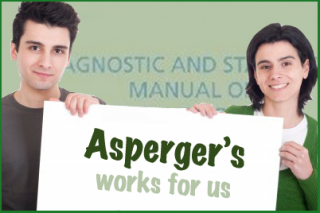Asperger's Syndrome
What We’ll Miss When We Miss Asperger Syndrome
Concern for services, self-identity, community and peace of mind
Posted December 7, 2012

The news that Asperger syndrome as diagnostic terminology has been unceremoniously dumped from the DSM was almost enough to bring on disruptive mood dysregulation disorder, an autistic friend of mine grimly joked. The comments below formed part of a single Facebook thread the day after the announcement:
“Screw the APA. I stand with Dr. Asperger, the man who really defined autism to the world.”
“back in 1960s I was DXed Autistic and written off and given up and drugged as a child....I hope we don't get those days back again. Most psychs seem to be ignorant and the new DSM seems to just open the door for a blanket approach.”
“The DSM is one of several guides, its as meaningful as spit. All our knowledge is based upon a house of cards, ie the knowledge that hasn’t yet been disproved.”
“I'm a 60-something aspie who wasn't diagnosed correctly until a couple of years ago. For most of my life, I've been a victim of AS being unknown and doctors and therapists not familiar with it. It was a relief to find out why I've felt like a square peg for so long.”
Another self-advocate posted, “APA: Kiss my ASperger’s!”
This is not to say Aspergerians are united in their grief. Plenty of autistic self-advocates (with various autism diagnoses) have rejected the Asperger’s label and welcome its incorporation into the Autistic Spectrum Disorder diagnostic category. But in this post I’m giving space to those who mourn. (Good news! We can now be diagnosed and medicated for bereavement.) Why will so many people miss this fuzzily defined, inadequate diagnosis?
The Asperger’s label has helped many who don’t fit the classic autism model or stereotype to get a diagnosis and accept their autism.
We don’t need data to tell us that Asperger’s is a less unnerving diagnosis than autism for those who haven’t come to terms with their own or their children’s special needs. This is an uncomfortable reality: many autistic self-advocates make a persuasive case that the Asperger’s/autism dichotomy penalizes and stigmatizes classic autism. (Blogger Brigianna Spencer, of Savannah GA, is autistic, as are two of her children. She told me: “Because Asperger's becomes stereotyped as the ‘good, mild, 'high-functioning’ autism, that leaves classic autism with the stigma of ‘the bad kind of autism’ simply by the existence of the contrast.”) Still, the fact remains that the Asperger’s diagnosis works well for individuals and families who do not (yet) share the self-advocates’ comfort with the autism label, or whose educators and clinicians (mis)understand autism more narrowly. This is the population that since 1994 might otherwise have missed out on an appropriate diagnosis and the services, supports and self-identity it can confer.
My friend and fellow blogger Michael Wilcox is at ease with being autistic, has impeccable self-advocacy credentials, and is given to citing research that emphasizes the commonalities of the brain across different forms of autism. Yet he too recognizes that the Asperger’s syndrome (AS) diagnosis was a critical piece of his story. He was diagnosed with Asperger’s at age 59, a transformative event that substantially changed his understanding of himself and his life.
“Would all of this have been different if there were no Asperger label? Yes, I think very much so. I had only a dim understanding of what it meant to be autistic, given the (persisting) common misconception of a link between autism and intellectual impairment. AS offered a way out of that pigeonhole, and led me to web resources, books, and organizations that were instrumental in helping me to come to grips with what it means to be autistic with above-average intelligence.” [LB: In fact, intelligence, high or low, is not a diagnostic criterion for any of the autism sub-types. The difference between Asperger's Disorder and Autistic Disorder is in the development of spoken language, which is delayed or unusual in Autistic Disorder.]
On that note, the Asperger’s diagnosis has been the gateway to education services, legal protections and other resources — and no less importantly, self-identity and community.
Many Aspergerians have discovered Asperger syndrome in adulthood. They don’t necessarily need or seek a formal diagnosis, but the recognition of the syndrome can be a source of unprecedented self-understanding, and a route to coping strategies, community and other supports. “Acknowledging the condition means much more than using it to get services,” Andrew Raymond, a software engineer in San Diego CA, who self-diagnosed almost ten years ago at 43, told me. “I don't need a diagnosis. But older adults who never heard of Aspergers (because they grew up pre-'94) are never going to find out about it, because they won't hear about it when it’s tucked under the autism diagnosis.”
The Asperger’s diagnosis has helped raised expectations of autistic people.
This is a tough one to applaud, again because of the possibility that those higher expectations around Asperger’s have contributed to lower expectations around classic autism. Could the new, broad autism categorization lead to a more enlightened and informed understanding of autism? That would be worth the pain of the loss of the Asperger terminology.
Alternatively, though, the new categorization might lower expectations all around. Contributing to....
The catch-all diagnostic category might tempt cash-strapped school administrators towards catch-all classrooms and services, conflating students with vastly differing needs and failing them across the board.
It could exacerbate a longstanding problem: the tendency towards cookie-cutter service provision based on diagnosis rather than students’ individual profiles. Services are supposed to be allocated according to need. But we know from overwhelming experience that the diagnosis carries weight. (For Social Security benefits, state agency support and public health insurance, the diagnosis can be essential.)
On the other hand, the broad diagnostic category might reinforce the common perception of people with Asperger-type profiles as “mildly” autistic, requiring few services and supports. The discreet Asperger’s diagnosis probably provided some protection against that.
Without Asperger’s, the autism category is too broad and unwieldy for organizing research and services.
Can a condition with such a tremendous range of manifestations and needs be adequately addressed via a single diagnosis? It’s possible that autism embraces sub-types and syndromes that haven’t yet been identified— so the ASD category might fracture again as the science advances. Granted, we don’t know yet what most of those sub-types look like. But we arguably can pick out one or two.
“It makes sense for many of the stakeholders to have some nomenclature for specific sub-populations that share specific sets of needs,” says an autistic self-advocate who serves with me on the AANE board of directors. “The Asperger population is one such sub-population. Non-speaking autistic people would benefit greatly from having an identified need for augmentative and alternative communication devices and proficiency in their use. So adoption of labels as shorthand for specific sub-populations within autism can be a good thing.”
The current diagnostic labels are a crude means of identifying need. But they aren’t necessarily less crude than no labels at all. We can google Asperger’s.
The Asperger’s diagnosis commemorates happier times before the APA ruined everything.
With the best will in the world, one can hardly argue that the APA’s handling of DSM-5 has been disciplined or respectful. The revision process has been a debacle, characterized by cavalier, inconsistent and paternalistic messages and public disputes between professionals. At times some members of the neurodevelopmental work group seemed almost to have had a communication disorder of their own, and an obliviousness recalling that of the past DSM committees that infamously defined homosexuality as a mental disorder.
Catherine Lord, director of the Institute for Brain Development at New York-Presbyterian Hospital, and the de facto spokesperson of the DSM neurodevelopmental work group, is the developer of a diagnostic tool that is considered adept at identifying classic autism. She has described Asperger syndrome as a mild condition, which it is not. She told the New York Times in 2009, “Asperger’s means a lot of different things to different people” (this is true, though the same applies to autism itself and to other conditions in the DSM). She added, “It’s confusing and not terribly useful,” a statement that eroded confidence in her objectivity and understanding of the disorder. And it didn’t get better from there.
Such misguided blurtings combined with public concerns around other controversial DSM diagnoses, charges of insufficient evidence and a lack of transparency, rushed field trials and delayed publication. Other professionals and advocates were distinctly underwhelmed.
In these circumstances, it is difficult to place much faith in the final product. The Global and Regional Asperger Syndrome Partnership (GRASP), based in New York, the New York Asperger’s organization, is encouraging clinicians to use the forthcoming International Classifications of Diseases (ICD) codes instead.
The Asperger’s label honors Hans Asperger, the Austrian physician who in 1944 identified the autism profile that later bore his name.
Some find Asperger's understanding of autism more meaningful and sympathetic than that of Leo Kanner, author of Autistic Disturbances of Affective Contact (1943) and originator of the infamous theory that “refrigerator mothers” caused autism in their children (later popularised by the psychologist Bruno Bettelheim). Hans Asperger’s instinct seems less pathologizing: “Autistic people have their place in the organism of the social community. They fulfill their role well, perhaps better than anyone else could, and we are talking of people who as children had the greatest difficulties and caused untold worries to their care-givers” (1944, translated by Uta Frith, 1991, Autism and Asperger syndrome. Cambridge University Press. pp. 37–92).
Not that this is sufficient reason for a diagnostic category. But we like the guy.




